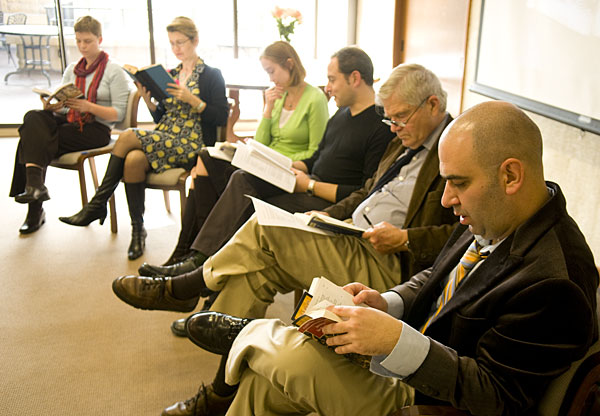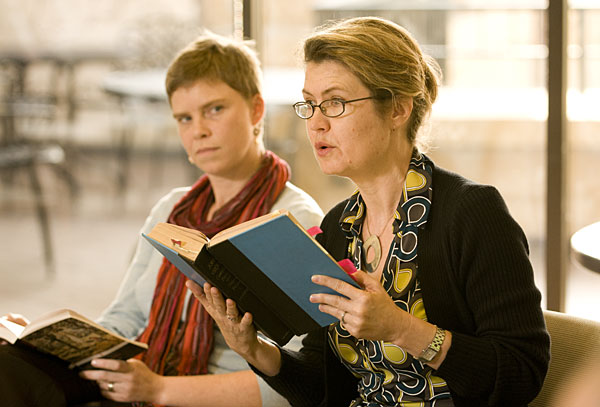Stanford celebrates as Milton turns 400

Stanford scholars and guests reading about the Garden of Eden in Book 4 of Paradise Lost: (left to right) Elizabeth Pentland of York University, English Prof. Jennifer Summit of Stanford, graduate student Jenna Lay of Stanford, David Goldstein of York University, English Prof. David Riggs of Stanford, Richard Preiss of the University of Utah.
BY CYNTHIA HAVEN
On an otherwise unremarkable December morning in 1608, a child was born on the second floor of a tenement on the east side of London's Bread Street, a noisy district of docks, stables, warehouses, churches, taverns, businesses and street traffic, above a sign of a spread eagle.
The spread eagle was a symbol for the scrivener's trade, the lawyerly profession of the child's father. But the real eagle was in the cradle. John Milton (1608-1674) soared to the loftiest heights of the English language with Paradise Lost.
To celebrate Milton's 400th birthday, students and scholars convened Dec. 4 in the Terrace Room of Margaret Jacks Hall to read the epic poem's 11,000 lines in 10 hours flat.
The reading and a symposium the following day commemorated another anniversary, too: English Professor J. Martin Evans has been ensconced as Stanford's resident Milton scholar for 45 years this month.
It's likely that Milton would have approved of the birthday party: Evans, who holds the William R. Kenan Jr. Chair, noted that Paradise Lost is meant to be read aloud. It was, after all, written when Milton was blind, and large chunks of the poem were composed in his head.
Professor Jennifer Summit, chair of the English Department, agreed: "No one is going to read it on his or her own," she said. "We live in a text-saturated environment, but we encounter them with scattered attention. This needs your full attention. You cannot multitask and read Milton.
"I believe this text is best read in a classroom, and with a master like Martin Evans. Milton's language repays close attention of a quality that, in our age of web-surfing, we have to work much harder to cultivate."
The same could be said of Milton's other works, including Lycidas, Comus, Samson Agnoistes and Paradise Regained, but no other works lends itself so readily to public readings as Paradise Lost does.
Marathon readings of Paradise Lost, Milton's blank-verse retelling of the first few chapers of Genesis (embellished with a prequel and behind-the-scenes action in Heaven), have been held all over the English-speaking world. Evans compared them to the cult-like followings for Wagner's Ring cycle. Milton marathons, however, are more manageable; producers don't need stage sets, orchestras, vast amounts of cash or even a huge audience.
Leading Milton scholars from North America were on hand to lend their voices. More than 80 people took turns at reading, and about half of the symposium speakers were at one time Evans' students.
'Breathing an Atlantic air'John Leonard, a professor at the University of Western Ontario and an editor of Milton's poems and prose for Penguin Classics, recalled Evans' phrase that Paradise Lost, with its overtones of colonialism, "breathes an Atlantic air."
"Martin himself breathes an Atlantic air," Leonard said of the Cardiff-born Oxonian, referring to Evans' British roots and American replanting. "I think it applies to his own work and career, as well as to Milton's epic."
Leonard cited Evans' four "really important" books on Milton, beginning with his first book at Oxford in 1968. Paradise Lost and the Genesis Tradition "is still a landmark in the field—superb in its time, never been matched since."
A former student—Angelica Duran of Purdue University, an organizer of the two-day event and editor for the Cambridge Companion to Milton and the Blackwell Concise Companion to Milton—agreed: "Most of us are embarrassed by our first book. Some books become dated—not this one."
Evans' early triumph was followed by The Road from Horton: Looking Backward in 'Lycidas' (1983), Milton's Imperial Epic (1996) and The Miltonic Moment (1998), among other works.
Evans coined the phrase "Miltonic moment" to describe a moment of crisis that takes place just before the action undergoes a dramatic turning point, looking at once backward to a past that is about to be transcended or repudiated and forward to a future that immediately begins to unfold.
Paradise Lost always has had a devoted following, and by the time the Stanford reading launched at 8 a.m. it was a standing-room only event. Was the draw Milton—or Evans? And why does Milton matter today, anyway? "Because all the issues he discussed are alive today," Evans said. "He writes about political freedom, gender relations, free will—all the things young people are thinking about—in his poems, in beautiful, transcendent language."
For Evans, the romance with Milton was pretty much love at first sight. In Wales, he had two "stupendously good teachers" as a teenager. "I fell hopelessly in love with the poetry. It was the most exciting thing I'd ever read," Evans said.
He manages to communicate that excitement to others: He has won every major teaching award Stanford offers. Summit said that when she encounters a student who is pondering an English major, "I send them to Martin's seminar, and that usually converts them."
Milton's modern championAlthough those attending the event were invited to wear costumes, none did. And there was no prelapsarian nudity. "Everyone will be wearing clothes," promised English lecturer Alice Staveley, another organizer of the event. "We're all fallen readers."
It's another decision Milton would have approved. He was, after all, a Puritan. In America, however, the word "Puritan" carries a lot of cargo. Evans insisted that English Puritans bear little resemblance to their dour American counterparts. For one thing, Milton "loved music, loved wine," Evans said. "Puritanism," in the American sense, is one of Milton's many bum raps.
The influential novelist, poet and critic Charles Williams ticked off the charges leveled at the purportedly proud and scornful Milton, rebutting his foes who maintained "the pride of his Satan was his own pride, and he approved it.
"They argued over his Arianism or his Calvinism. They confined his instrument to the organ. They denied him cheerfulness and laughter (he who, it is said, used to sing while he had the gout!). They gloomed over him, as (they supposed) he, in his arrogant self-respect, gloomed over the world," Williams wrote in The English Poems of John Milton (1940).
But in today's world, so far from Bread Street and the blind prophet, Milton has few champions as unflagging as the redoubtable Evans. Milton is frequently charged with sexism, if not a glum misogyny, but Evans volleys back that Milton "was one of the most advanced thinkers about marriage and divorce in Europe." The thrice-wed Milton "writes most movingly about marriage," Evans says. In an era when adultery or non-consummation was about the only way out of the tie that binds, Milton supported divorce in cases of incompatibility.
Yes, but in a society where women had few means to provide for themselves, didn't these "no fault" laws have the potential to leave children abandoned and women in poverty?
"That's society's problem," Evans counters. Besides, he says, "Nobody took the slightest notice of him."
But he was a tyrannical and abusive father to his three daughters, no? Evans dismisses the charge with a smile. That was only because "he made them read to him in languages they didn't understand," he replies.
What about Milton's support of Oliver Cromwell, the "brave bad man" (in the words of one contemporary historian) who brought civil war to England? "It one of the greatest periods of English history," Evans says of Cromwell's short-lived Commonwealth, though adding, "Cromwell's policy in Ireland was barbarous, I admit." Barbarous treatment of Ireland, however, had been in place since Elizabeth I. (Evans' apologetics may be contagious.)
But did Cromwell's reforms justify the first formal judicial proceeding to execute a European king, which became a dangerous and frequently repeated precedent for revolutionary bloodshed? What, finally, of regicide? Didn't Milton reason that the execution of Charles I was a job well done?
"You have a very romantic view of Charles I," Evans concludes, silkily but firmly. Evans is evidently of the Roundhead, not royalist, stamp. He has hardly a good word for the martyred king, who was made a saint by the Church of England. "He suspended Parliament for 11 years," Evans says of the monarch. "These were not good years." A lot of emigration to America occurred during Charles' reign, he adds.
Clearly, no charges will stick. Evans' certitude is persuasive. "He was a much more learned poet than anyone in the English language—by a country mile," Evans says.
The feminist Milton, the Marxist MiltonMilton is continually being reinvented, according to Summit. "Milton is not so easily written off or explained. It's a text we keep returning to."
"I think that Milton has been the test case for a number of critical movements in the last 50 years," Summit said. Referring to Paradise Lost, she added: "Because of its incredibly rich texts, it's rewarding to a wide range of reading practices. The last 20 or 30 years have seen a feminist Milton, a Marxist Milton, a historicist Milton."
Hence, Milton's popular image as the scowling, taciturn prophet is past its expiration date. Williams wrote: "So far from being granite, his verse is a continual spring of beauty, of goodness, of tenderness, of humility. The one thing he always denounced as sin and (equally) as folly was the self-closed, 'independent' spirit, the spirit that thinks itself of 'merit,' especially 'of insured merit.' It does not seem a moral entirely without relevance to us."
In the all-day marathon, one could hear anew the poet who, according to Evans, "varies in tone from extreme softness and delicacy to full-bore brass trumpets." Award-winning poet Linda Gregerson of the University of Michigan, a former Evans student, lulled the listener in her elegant, polished, liquid reading. Richard Preiss of the University of Utah dropped to basso profundo as Mammon, Death and Chaos in Book 2. (He confessed that, despite an infatuation with Milton under Evans' tutelage at Stanford, he eventually focused on English Renaissance theater.) The star turn was John Leonard's fiery spin as Satan, rallying the fallen angels to mount their attack on heaven.
Leonard's dramatic reading of Satan, standing and thundering like a fiendish version of Henry V at Agincourt, earned resounding applause. Maybe Evans has a point. Maybe Milton really needs to be heard live.
Evans turned and beamed as Book 5 drew to a close and the group broke for lunch. "See what I mean?" he said.



Share This Story